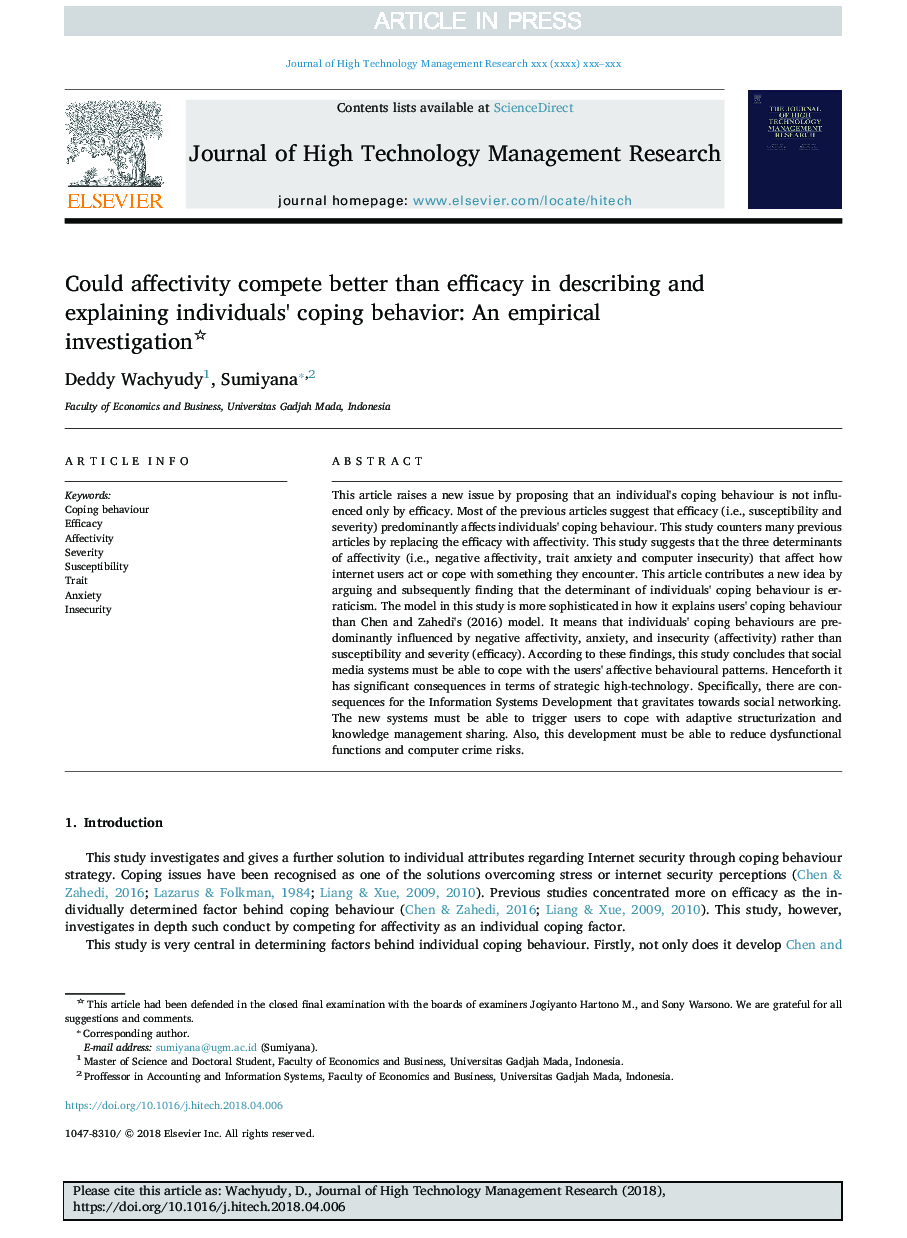| کد مقاله | کد نشریه | سال انتشار | مقاله انگلیسی | نسخه تمام متن |
|---|---|---|---|---|
| 7429221 | 1483318 | 2018 | 14 صفحه PDF | دانلود رایگان |
عنوان انگلیسی مقاله ISI
Could affectivity compete better than efficacy in describing and explaining individuals' coping behavior: An empirical investigation
ترجمه فارسی عنوان
آیا تأثیر پذیری بهتر از اثربخشی در توصیف و توضیح رفتار افراد است: تحقیق تجربی
دانلود مقاله + سفارش ترجمه
دانلود مقاله ISI انگلیسی
رایگان برای ایرانیان
کلمات کلیدی
رفتارهای مقابله، اثر، وابستگی، شدت حساسیت، صفت، اضطراب، ناامنی،
ترجمه چکیده
این مقاله موضوع جدیدی را مطرح می کند که پیشنهاد می کند رفتار انطباقی فرد تنها تحت تأثیر تاثیر قرار نگیرد. اکثر مقالات قبلی نشان می دهد که اثربخشی (به عنوان مثال حساسیت و شدت) عمدتا تحت تاثیر رفتار افراد مقابله قرار می گیرد. این مطالعه با مقایسۀ بسیاری از مقالات قبلی با جایگزینی اثر بخشی با تأثیرپذیری. این مطالعه نشان می دهد که سه عامل تعیین کننده ی تأثیر (مثلا نفوذ منفی، اضطراب شغلی و ناامنی کامپیوتری) که بر کاربران اینترنت تاثیر می گذارد یا با آن مواجه می شوند. این مقاله، با استدلال و در نتیجه آن که یک عامل تعیینکننده رفتار رفتارهای مقابله با افراد، بی اعتمادی است، ایده جدیدی را به وجود می آورد. مدل در این مطالعه پیچیده تر است که چگونه رفتار رفتار مقابل کاربران را نسبت به مدل چن و زاهدی (2016) توضیح می دهد. بدین معنی است که رفتارهای مقابله ای افراد عمدتا تحت تأثیر تأثیر منفی، اضطراب و ناامنی (وابستگی) به جای حساسیت و شدت (کارآیی) قرار می گیرند. بر اساس این یافته ها، این مطالعه نتیجه می گیرد که سیستم های رسانه های اجتماعی باید بتوانند الگوهای رفتاری عاطفی کاربران را کنار بگذارند. از این پس عواقب قابل ملاحظه ای در فناوری های استراتژیک دارد. به طور خاص، عواقب برای توسعه سیستم های اطلاعاتی که به سوی شبکه های اجتماعی جلب می شود وجود دارد. سیستم های جدید باید قادر باشند کاربران را در جهت سازگاری با ساختار و مدیریت دانش به اشتراک بگذارند. همچنین این توسعه باید قادر به کاهش عملکرد توابع ناکارآمد و خطرات جرایم کامپیوتری باشد.
موضوعات مرتبط
علوم انسانی و اجتماعی
مدیریت، کسب و کار و حسابداری
مدیریت فناوری و نوآوری
چکیده انگلیسی
This article raises a new issue by proposing that an individual's coping behaviour is not influenced only by efficacy. Most of the previous articles suggest that efficacy (i.e., susceptibility and severity) predominantly affects individuals' coping behaviour. This study counters many previous articles by replacing the efficacy with affectivity. This study suggests that the three determinants of affectivity (i.e., negative affectivity, trait anxiety and computer insecurity) that affect how internet users act or cope with something they encounter. This article contributes a new idea by arguing and subsequently finding that the determinant of individuals' coping behaviour is erraticism. The model in this study is more sophisticated in how it explains users' coping behaviour than Chen and Zahedi's (2016) model. It means that individuals' coping behaviours are predominantly influenced by negative affectivity, anxiety, and insecurity (affectivity) rather than susceptibility and severity (efficacy). According to these findings, this study concludes that social media systems must be able to cope with the users' affective behavioural patterns. Henceforth it has significant consequences in terms of strategic high-technology. Specifically, there are consequences for the Information Systems Development that gravitates towards social networking. The new systems must be able to trigger users to cope with adaptive structurization and knowledge management sharing. Also, this development must be able to reduce dysfunctional functions and computer crime risks.
ناشر
Database: Elsevier - ScienceDirect (ساینس دایرکت)
Journal: The Journal of High Technology Management Research - Volume 29, Issue 1, 2018, Pages 57-70
Journal: The Journal of High Technology Management Research - Volume 29, Issue 1, 2018, Pages 57-70
نویسندگان
Deddy Wachyudy, Sumiyana Sumiyana,
